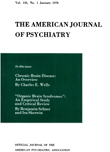Psychotherapy: historical roots, universal elements, and cultural variations
Abstract
The authors review various forms of traditional psychotherapeutic interventions to trace the historical development of psychotherapy, which demonstrates a shift in focus from the supernatural world, to the natural world, to the physical person, then to the psychological person. The basic processes of identifying problems, providing explanations, and prescribing for change are observed among various kinds of treatment systems. Universal elements fundamental to successful treatment can be identified in each of these processes, and each is strongly modified by cultural factors. The authors conclude that the special cultural dimension of psychotherapy consists of defining cultural norms, reinforcing culturally sanctioned coping mechanisms, and providing "time out" from usual cultural expectations.
Access content
To read the fulltext, please use one of the options below to sign in or purchase access.- Personal login
- Institutional Login
- Sign in via OpenAthens
- Register for access
-
Please login/register if you wish to pair your device and check access availability.
Not a subscriber?
PsychiatryOnline subscription options offer access to the DSM-5 library, books, journals, CME, and patient resources. This all-in-one virtual library provides psychiatrists and mental health professionals with key resources for diagnosis, treatment, research, and professional development.
Need more help? PsychiatryOnline Customer Service may be reached by emailing [email protected] or by calling 800-368-5777 (in the U.S.) or 703-907-7322 (outside the U.S.).



